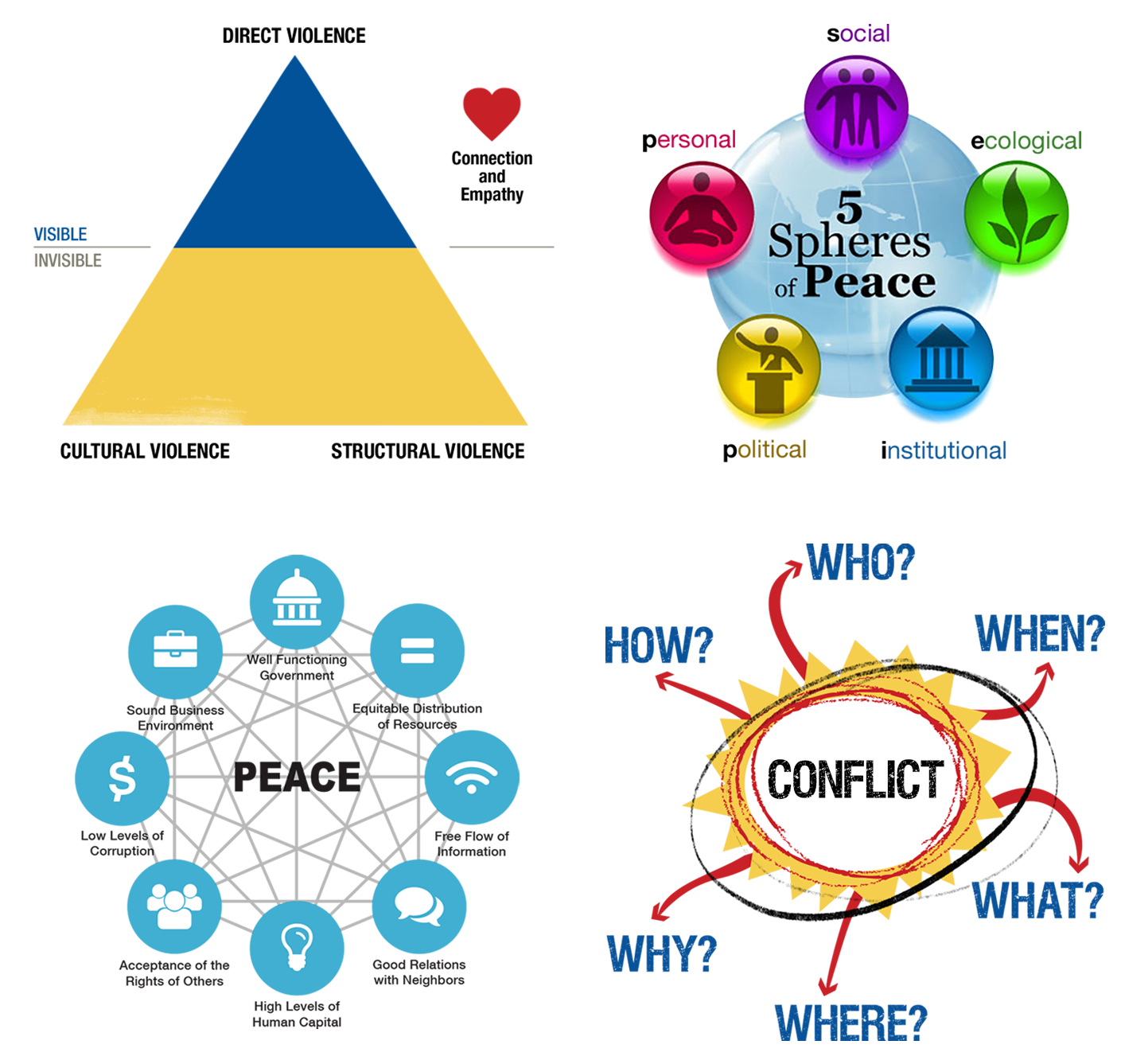
My Peacebuilder Foundations
Each moment is a chance for us to make peace with the world, to make peace possible for the world, to make happiness possible for the world.
— Thich Nhat Hanh
OVERVIEW
My Peacebuilder Foundations is an interactive, online course delivered in sequential modules for high school students.
Course completion achieves understanding of fundamental drivers of conflict and peace, the ability to imagine innovative approaches to change, and skills to frame an issue problem statement and create a peace project idea.
Through the course, students learn to use established frameworks to consider how power, conflict, violence and peace intersect. Among these are four that are well-known in conflict resolution and peacebuilding: Galtung’s Triangle of Violence to distinguish different types of violence; 5 Spheres of Peace to examine right relationships; Eight Pillars of Peace to understand systemic drivers of conflict & peace; Conflict Mapping to analyze a specific conflict.
My Peacebuilder Foundations includes content that is useful to students in other class research, papers and capstone projects. Every module uses technology-based ideas-sharing tools.
Built-in assessments ensure that students who complete the course can receive a certificate from NewGen Peacebuilders and Youth & Peace in Action.
To support students in completing My Peacebuilder Foundations, teachers have full access to the content as well as an additional toolkit of downloadable activities, materials, and conversation prompts that they can use in ways that support subject lessons and standards.
newgen peacebuilders 7h framework
The course is delivered through a series of online modules that leverage the NewGen Peacebuilders 7H Framework. Each module takes about 60-90 minutes to complete, and is broken up into sections that can be completed within 15 minutes (ideal for use in academic class settings). Estimated course completion time is 10 hours. Course completion achieves understanding of fundamental drivers of conflict and peace, the ability to imagine innovative approaches to change, and skills to frame an issue problem statement and create a peace project idea.
Together, the modules incorporate:
Role of young people as essential peacebuilders
〰️
Distinctions between “negative peace” and “positive peace”
〰️
Indexes of global peace, positive peace, human development, happiness
〰️
Distinctions between pity, sympathy, empathy, altruism, compassion
〰️
Active listening, focusing, self-awareness, emotional management
〰️
How to identify underlying drivers of conflict and peace
〰️
Distinctions between service and peace as a process for positive change
Role of young people as essential peacebuilders 〰️ Distinctions between “negative peace” and “positive peace” 〰️ Indexes of global peace, positive peace, human development, happiness 〰️ Distinctions between pity, sympathy, empathy, altruism, compassion 〰️ Active listening, focusing, self-awareness, emotional management 〰️ How to identify underlying drivers of conflict and peace 〰️ Distinctions between service and peace as a process for positive change
-
healing module
In the Healing module, students learn about the importance of “right relationships,” and explore paths to healing using the 5 Spheres of Peace framework from the National Peace Academy. They begin to consider how, through a peace project, you can bring healing to a community. This section of the Healing module provides students with an overview of human rights, and their importance in a peacebuilding context.

-
Heart Module
Putting the heart in peacebuilding is about coming alongside, listening and reflecting, and overcoming what stops us from connecting. The Heart module introduces learners to tools and skills related practicing empathy and compassion as peacebuilders. This section of the Heart module provides a case study of one group of young peacebuilders who used an empathy walk to inform peace projects.

-
hands module
The Hands module introduces peacebuilding frameworks, including the Eight Pillars of Positive Peace from the Institute for Economics and Peace, that typically would only be used by those in university studying peace and conflict resolution, or working in international relations, nonprofit, or social entrepreneurship. This section of the Hands Module provides an overview of ten key categories for peace projects, and 30 related project examples to inspire young peacebuilders.

bring mpf to a high school
ELIGIBILITY
YPA is signing up high schools and youth service clubs/organizations to participate in the 2023-24 school year! Any high school in the United States can join in! Schools in the mid-Atlantic and southeastern United States are (see geography specified in the map) are especially encouraged to sign up!
1,000 schools or clubs can participate at no cost
The innovative course My Peacebuilder Foundations (MPF) course is available upon request and at no cost for up to 1,000 high schools. “MPF” content applies to both service hour requirements and peacebuilder certifications. Many teachers have found creative ways to use content in civics, social studies, leadership, and other classes.
broaden the EXPERIENCE through LEADING PEACE PROJECT TEAMS
Up to 10 students from a service club can also participate in Leading Peace Project Teams (LPPT) training, create at least one peace project, and access case studies of successful youth-led peace projects. Students, parents, and community leaders get excited by how “LPPT” develops project management skills and results in hands-on peace projects. In many cases, sponsorship from a local community organization / Rotary Club can support the participation of at least one project team from a high school.






